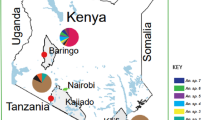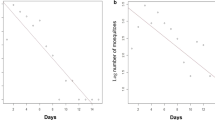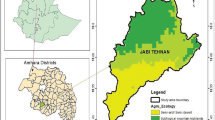Abstract
THE daily survival-rates of Anopheles gambiae and A. funestus in two areas of tropical Africa have recently been estimated from the ratio of their sporozoite-rates immediately on capture and those recorded after keeping wild-caught specimens alive for the duration of the extrinsic cycle of the predominant malaria parasite1,2. This method naturally involves considerable time for the dissection and keeping alive of significant numbers of mosquitoes.
This is a preview of subscription content, access via your institution
Access options
Subscribe to this journal
Receive 51 print issues and online access
$199.00 per year
only $3.90 per issue
Buy this article
- Purchase on SpringerLink
- Instant access to full article PDF
Prices may be subject to local taxes which are calculated during checkout
Similar content being viewed by others
References
Davidson, G., and Draper, C. C., Trans. Roy. Soc. Trop. Med. Hyg., 47, 522 (1953).
Davidson, G. (in the press).
Mer, G. G., Bull. Ent. Res., 23, 563 (1932).
Macdonald, G., Trans. Roy. Soc. Trop. Med. Hyg., 46, 227 (1952).
Gillies, M. T., Ann. Trop. Med. Parasit., 48, 58 (1954).
Gillies, M. T., E. Afr. Med. J., 30, 129 (1953).
Author information
Authors and Affiliations
Rights and permissions
About this article
Cite this article
DAVIDSON, G. Estimation of the Survival-Rate of Anopheline Mosquitoes in Nature. Nature 174, 792–793 (1954). https://doi.org/10.1038/174792a0
Issue date:
DOI: https://doi.org/10.1038/174792a0
This article is cited by
-
Effect of spatiotemporal variables on abundance, biting activity and parity of Nyssorhynchus darlingi (Diptera: Culicidae) in peri-Iquitos, Peru
Malaria Journal (2024)
-
Key considerations, target product profiles, and research gaps in the application of infrared spectroscopy and artificial intelligence for malaria surveillance and diagnosis
Malaria Journal (2023)
-
Vectorial capacities for malaria in eastern Amazonian Brazil depend on village, vector species, season, and parasite species
Malaria Journal (2022)
-
An overview of malarial Anopheles mosquito survival estimates in relation to methodology
Parasites & Vectors (2020)
-
Reduced mosquito survival in metal-roof houses may contribute to a decline in malaria transmission in sub-Saharan Africa
Scientific Reports (2019)



